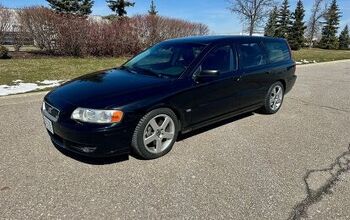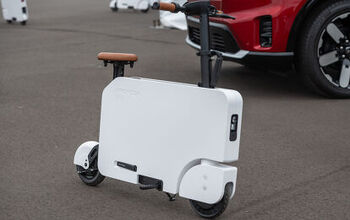BREAKING: GM Sale of Opel, Vauxhall to France's PSA Group Could Happen Within Days

Multiple media sources are reporting that an acquisition of General Motors’ European divisions by France’s PSA Group could occur within a matter of days.
Talks between GM and PSA, maker of the Peugeot, Citroën and DS brands, are reportedly at an “advanced stage.” If finalized, the deal would see GM shed the money-losing divisions it has owned for nearly a century.
Speaking to Germany’s Handelsblatt earlier this morning, a spokesperson for Peugeot claimed that the talks did not concern an expanded partnership, but rather an outright acquisition of GM’s German and British subsidiaries.
GM purchased Vauxhall in 1925 and Opel in 1929. Product alignment between Detroit and Europe tightened in past years as GM adopted global architecture. The next-generation Buick Regal, based on the Opel Insignia, is expected to be built in Germany. How the potential sale will affect products like the Regal remains to be seen.
While the two brands give GM a strong presence in Europe, Opel and Vauxhall have kneecapped GM’s finances year after year. Last profitable in 1999, the two brands were expected to turn a profit in 2016. What actually occurred was a $257 million loss.
Attributing factors included Britain’s decision to leave the European Union, which depressed the UK’s currency. PSA, on the other hand, is surging after years of decline. The French automaker, buoyed by a government bailout, has an aggressive plan to boost profits and increase its share of the European market.
Handing over a majority stake in the two companies would wrestle GM free of the financial burden. It would also make PSA the continent’s second-largest automaker, holding 16 percent of the European market, reports Bloomberg. PSA shares climbed following the news.
GM sold its 7-percent stake in PSA in 2013, though the two companies continue to share production of SUVs and minivans.
In a statement, the American automaker downplayed expectations:
PSA Group and General Motors confirm they are exploring numerous strategic initiatives aiming at improving profitability and operational efficiency, including a potential acquisition of Opel Vauxhall by PSA.
[Image: General Motors]

More by Steph Willems
Latest Car Reviews
Read moreLatest Product Reviews
Read moreRecent Comments
- Jalop1991 In a manner similar to PHEV being the correct answer, I declare RPVs to be the correct answer here.We're doing it with certain aircraft; why not with cars on the ground, using hardware and tools like Telsa's "FSD" or GM's "SuperCruise" as the base?Take the local Uber driver out of the car, and put him in a professional centralized environment from where he drives me around. The system and the individual car can have awareness as well as gates, but he's responsible for the driving.Put the tech into my car, and let me buy it as needed. I need someone else to drive me home; hit the button and voila, I've hired a driver for the moment. I don't want to drive 11 hours to my vacation spot; hire the remote pilot for that. When I get there, I have my car and he's still at his normal location, piloting cars for other people.The system would allow for driver rest period, like what's required for truckers, so I might end up with multiple people driving me to the coast. I don't care. And they don't have to be physically with me, therefore they can be way cheaper.Charge taxi-type per-mile rates. For long drives, offer per-trip rates. Offer subscriptions, including miles/hours. Whatever.(And for grins, dress the remote pilots all as Johnnie.)Start this out with big rigs. Take the trucker away from the long haul driving, and let him be there for emergencies and the short haul parts of the trip.And in a manner similar to PHEVs being discredited, I fully expect to be razzed for this brilliant idea (not unlike how Alan Kay wasn't recognized until many many years later for his Dynabook vision).
- B-BodyBuick84 Not afraid of AV's as I highly doubt they will ever be %100 viable for our roads. Stop-and-go downtown city or rush hour highway traffic? I can see that, but otherwise there's simply too many variables. Bad weather conditions, faded road lines or markings, reflective surfaces with glare, etc. There's also the issue of cultural norms. About a decade ago there was actually an online test called 'The Morality Machine' one could do online where you were in control of an AV and choose what action to take when a crash was inevitable. I think something like 2.5 million people across the world participated? For example, do you hit and most likely kill the elderly couple strolling across the crosswalk or crash the vehicle into a cement barrier and almost certainly cause the death of the vehicle occupants? What if it's a parent and child? In N. America 98% of people choose to hit the elderly couple and save themselves while in Asia, the exact opposite happened where 98% choose to hit the parent and child. Why? Cultural differences. Asia puts a lot of emphasis on respecting their elderly while N. America has a culture of 'save/ protect the children'. Are these AV's going to respect that culture? Is a VW Jetta or Buick Envision AV going to have different programming depending on whether it's sold in Canada or Taiwan? how's that going to effect legislation and legal battles when a crash inevitibly does happen? These are the true barriers to mass AV adoption, and in the 10 years since that test came out, there has been zero answers or progress on this matter. So no, I'm not afraid of AV's simply because with the exception of a few specific situations, most avenues are going to prove to be a dead-end for automakers.
- Mike Bradley Autonomous cars were developed in Silicon Valley. For new products there, the standard business plan is to put a barely-functioning product on the market right away and wait for the early-adopter customers to find the flaws. That's exactly what's happened. Detroit's plan is pretty much the opposite, but Detroit isn't developing this product. That's why dealers, for instance, haven't been trained in the cars.
- Dartman https://apnews.com/article/artificial-intelligence-fighter-jets-air-force-6a1100c96a73ca9b7f41cbd6a2753fdaAutonomous/Ai is here now. The question is implementation and acceptance.
- FreedMike If Dodge were smart - and I don't think they are - they'd spend their money refreshing and reworking the Durango (which I think is entering model year 3,221), versus going down the same "stuff 'em full of motor and give 'em cool new paint options" path. That's the approach they used with the Charger and Challenger, and both those models are dead. The Durango is still a strong product in a strong market; why not keep it fresher?


































Comments
Join the conversation
This strikes me as a accounting decision. Engineering and sales were out voted. It also reminds me of their brief ownership of Lotus. Accounting saw that they were spending more money with Lotus for engineering than the company was worth. So they bought them. Then as they started to invest into the car business they realized why it was valued so low. It took them 7 years to change their minds. We have seen this before with other large manufactures as they expand their "empires" then later decide to concentrate on their "core values."
Whatever. Dust off the tooling for the B and H body.